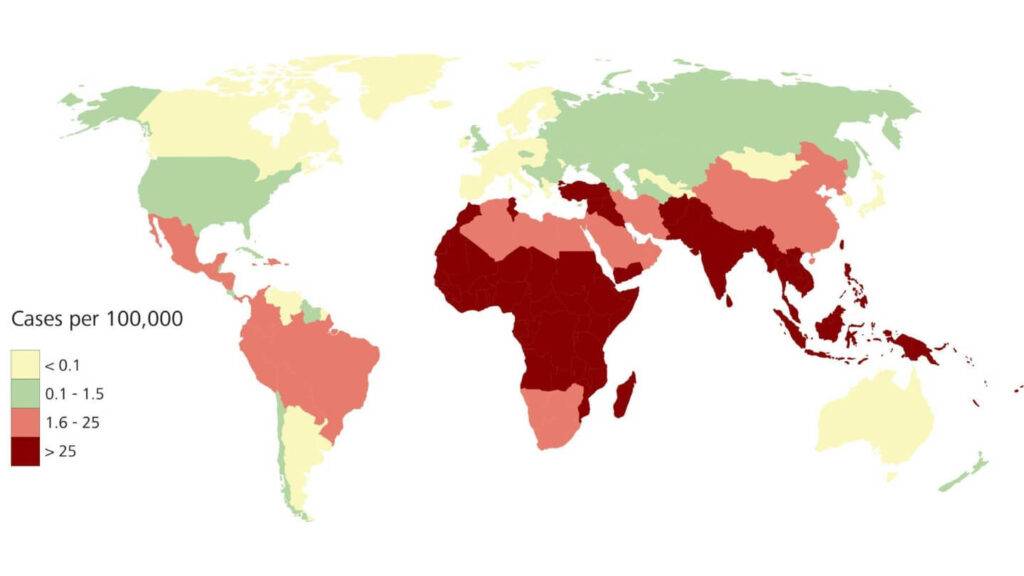
Typhoid fever is a serious, potentially life-threatening bacterial infection that primarily affects the intestines and bloodstream. It remains prevalent in many developing regions and is a common concern for international travellers.
Typhoid fever is caused by a bacterium called Salmonella enterica serotype Typhi (commonly referred to as Salmonella typhi). It spreads through:
Once inside the body, the bacteria travel through the digestive system, enter the bloodstream, and begin to multiply, causing widespread infection.
Globally, typhoid fever affects 11 to 21 million people each year, with over 100,000 deaths reported annually. It’s most common in regions with limited access to clean water and modern sewage systems.
In the UK, typhoid fever is rare, but cases still occur — almost always in travellers returning from high-risk countries.
Symptoms usually develop 1 to 2 weeks after exposure and may last several weeks if untreated. Common symptoms include:
If left untreated, complications can include intestinal perforation, sepsis, or severe bleeding — all of which require emergency hospital treatment.
Typhoid fever is typically diagnosed using:
Early diagnosis is essential to start appropriate antibiotic treatment and prevent complications.
Treatment usually involves a 7–14 day course of antibiotics, including ciprofloxacin, azithromycin, or ceftriaxone (depending on the resistance pattern). Most patients recover fully with prompt treatment.
However, antibiotic-resistant strains are becoming more common, especially in South Asia, making prevention through vaccination even more important.
You may be at increased risk if you:
High-risk regions include:
Children, older adults, and immunocompromised individuals are particularly vulnerable.

Getting the typhoid vaccine is the most effective way to reduce your risk. There are two main types:
At OnlineChemist’s Travel Clinic in Great Yarmouth, we provide the Typhim Vi injectable vaccine, suitable for adults and children aged 2 years and above. Our clinic offers:
We serve patients in Great Yarmouth, Gorleston, Lowestoft, Norwich, Beccles, Acle, Hemsby, and the wider Norfolk and Suffolk area.
→ Book your typhoid vaccination appointment now
The typhoid vaccine should be given at least 2 weeks before travel to allow your body time to build immunity. If you’re travelling soon, contact us as early as possible — we often have same-day appointments available.
While typhoid fever is rare in the UK, it remains a real risk for travellers. The infection can be severe, but it is entirely preventable with a simple vaccine and basic food and water precautions.
If you’re planning to travel to a high-risk region, make sure you’re protected.
NHS UK – Typhoid Fever
https://www.nhs.uk/conditions/typhoid-fever
Fit for Travel – Public Health Scotland
https://www.fitfortravel.nhs.uk/advice/disease-preventions/vaccinations/typhoid
World Health Organization (WHO) – Typhoid
https://www.who.int/news-room/fact-sheets/detail/typhoid
UK Health Security Agency (UKHSA) – Immunisation against infectious disease (Green Book)
https://www.gov.uk/government/collections/immunisation-against-infectious-disease-the-green-book
CDC – Typhoid Fever (U.S. Centers for Disease Control and Prevention)
https://www.cdc.gov/typhoid-fever/index.html
Authored by:

BPharm, MPharm, PGDip (Pharmacy), MRPharmS, IP
Pharmacist Independent Prescriber

Online Chemist
82 Middleton Road
Gorleston
Great Yarmouth
Norfolk, NR31 7AH
Phone: 01493 600610
Email: info@onlinechemistuk.net
Superintendent Pharmacist:
Obaidullah Zaman
BPharm, MPharm, PGDip (Pharmacy), MRPharmS, IP
GPhC Reg. Number: 2083409
Pharmacy Premises GPhC Reg. Number: 9011159
Monday 09:00 – 17:00
Tuesday 09:00 – 17:00
Wednesday 09:00 – 17:00
Thursday 09:00 – 17:00
Friday 09:00 – 17:00
Saturday Closed
Sunday Closed
Click here for driving directions
OnlineChemist is a trading name of Nomaz Limited.
Registered in England – 11349276.
© 2025 All rights reserved.
Store Notice: Orders placed after 11:00 AM on Thursday, 17th April 2025 will be processed on the next working day, Tuesday, 22nd April 2025, due to the bank holiday weekend. Thank you for your understanding. Dismiss